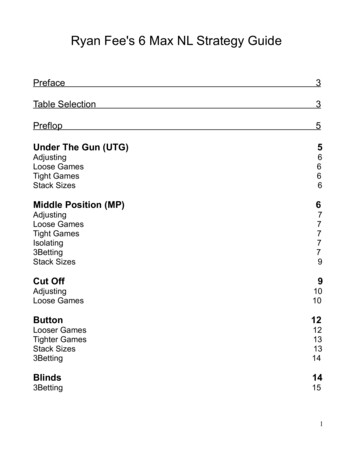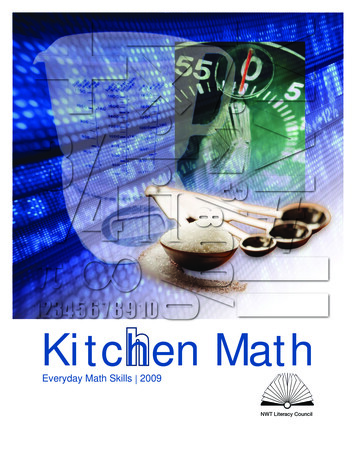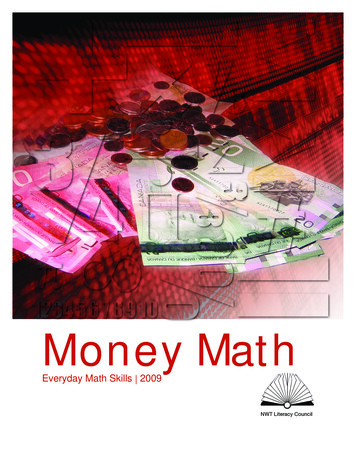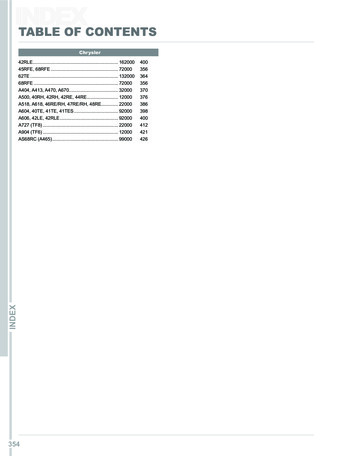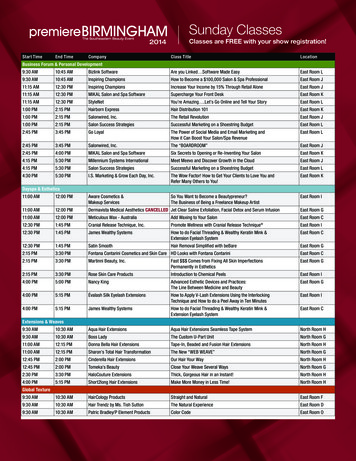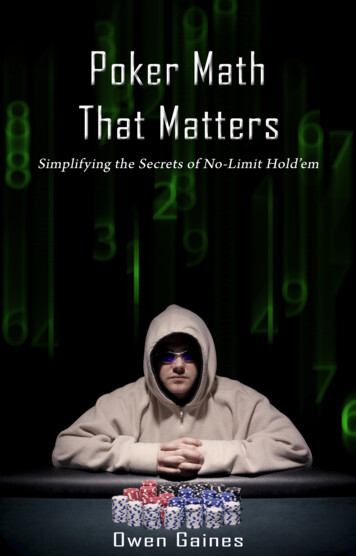
Transcription
Poker MathThat MattersSimplifying the Secrets of No-Limit Hold’emByOwen Gaines
Poker Math That MattersCopyright 2010 by Owen GainesPublished by Owen GainesAll rights reserved. No part of this book may be reproduced ortransmitted in any form or by any means without writtenpermission from the author.To request to use any part of this book in any way, write to:owen@qtippoker.comTo order additional copies, visit www.qtippoker.comISBN-13: 978-0-615-39745-0ISBN-10: 0-615-39745-XPrinted in the United States of America
ivTable of ContentsAcknowledgements . viiiAbout Owen Gaines . xAbout this Book. 1Introduction . 3Why Math Matters. 3Quiz . 6Measurements . 9Your Surroundings . 9Quiz . 14Thinking About Bets in No-Limit Hold'em. 15Quiz . 17Your Expectations . 18Quiz . 22Getting Started with Numbers . 23Working with Fractions, Percentages and Ratios . 23Quiz . 27Expectation Value . 29Quiz . 33Hit the Deck. 35Counting Outs. 35Quiz . 44The 4/2 Rule . 50
vQuiz . 57Putting It Together. 59Pot Odds . 59Quiz . 64Implied Odds . 66Quiz . 69World of the Unknown . 71Combinations. 71Quiz . 78Equity Versus a Range . 81Quiz . 87Which Bucks?. 89Quiz . 92Aggression . 93Bluffing . 93Quiz . 97Semi-bluffing. 99Quiz . 106Value-Betting . 108Quiz . 113At the Table . 117A Bit of Memory . 117Quiz . 120Chunking . 121Quiz . 126
viSet-Mining . 127Quiz . 130How Much to Bet?. 131Quiz . 137Balanced Play . 139Quiz . 145Summary . 147Champions . 147Appendix A . 149True EV and Evaluative EV . 149Appendix B. 151When Villain is EV . 151Quiz Answers . 153Why Math Matters Quiz Answers . 153Thinking About Bets in No-Limit Hold'em Quiz Answers . 154Your Expectations Quiz Answers . 155Working with Fractions, Percentages and Ratios QuizAnswers . 157The 4/2 Rule Quiz Answers . 172Pot Odds Quiz Answers. 174Implied Odds Quiz Answers . 176Combinations Quiz Answers . 178Equity Versus a Range Quiz Answers. 181Which Bucks Quiz Answers . 184Bluffing Quiz Answers . 186Semi-Bluffing Quiz Answers . 188
viiValue-Betting Quiz Answers . 191A Bit of Memory Quiz Answers . 197Chunking Quiz Answers. 198Set-Mining Quiz Answers . 199How Much to Bet Quiz Answers. 200Balance Quiz Answers . 202Glossary . 205
viiiAcknowledgementsOne of the most valuable things for a professional poker playerto have is friends who understand the game. Being aprofessional poker player can make you feel like you’re on anisland. Having those friends really helps you feel moreconnected. Outside of that benefit, these friends have not onlyenriched my life, but have also taken a lot of time to help medevelop my poker game. I would not be the player I am todayhad it not been for their generous efforts.I'd like to give special thanks to Steven Gallaher and Matt Hanesfor patiently helping me learn the mathematics involved inanalyzing poker situations. Without them, it's doubtful I everwould have understood the mathematical concepts I present inthis book.
ix
xAbout Owen GainesI was always a bit fascinated with poker and had read a smallbook or two on it long before I ever got a chance to try playing.Then, one day in 2004, a friend told me I could play pokeronline. I decided to check it out. I knew very little about pokerat that point, but I bought a lot of books on limit hold'em, joineda poker forum, and began to work very hard learning the game. Ideposited 300, but I lost that rather quickly in the .50/ 1 limithold’em games. I decided to give poker one more 300 attempt.That one stuck. I started to see the hard work pay off and built upa nice bankroll for the limit hold'em games. Since my hourly rateplaying poker was double that of my entry-level, nine-to-fivejob, I felt playing poker professionally was the best option forme. So, I started playing poker professionally in the summer of2005. From there, I played about a million hands of limithold’em and experienced good results.In early 2007, after a short break from the tables, I set aside 300to mess around playing no-limit hold’em. I had never really beeninterested in no-limit, but I had heard good things and decided tocheck it out. Fortunately all of my limit experience helped metransition to no-limit very easily. I started playing a lot of nolimit and worked my way up the stakes. I also found I reallyenjoyed playing no-limit. In 5 months, I turned the 300 into 30,000 and have been playing no-limit hold’em as my maingame ever since.As of the summer of 2010, I’ve played about three million handsof poker and have been playing professionally for over fiveyears, providing the sole income for a family of five. Online
xipoker fits my family's lifestyle very well, and my family andfriends have all adjusted to it.I’ve always enjoyed teaching and have taught in several differentfields. In early 2009, I started offering personal poker coachingand making poker-training videos for dragthebar.com. I’ve had agreat time helping others develop their poker skills, and I hopeplayers continue to improve from my efforts in this book.
1About this BookWhile I'm normally a quick learner with new material,understanding how to play good poker came to me a bit moreslowly than I had hoped. Often times a concept would finallysink in and I would find myself wondering why I'd never seensomeone explain it in a simpler manner. The mathematics ofpoker was certainly one of those topics. I got a hold of everybook on poker math I could find, but none of them was helpingme. Who cares about the odds to flop a straight flush or that19,600 flops can come down? It seemed I was always left with apile of numbers and no way to put the pieces together to reallyplay great poker. I continued working on my own and probingfor information; finally, the pieces started coming together.Understanding the mathematics of poker has made a dramaticdifference in my poker game. This book is an attempt to helpthose who do not have a strong inclination to math or gametheory but would really like to improve their poker skills. Idesigned this material in an attempt to not leave any readerbehind. I started with the most basic concepts and worked upfrom there. When finished with this book, you will be able tothink clearly about no-limit hold’em and analyze even some ofthe most complex decisions in the game. This will make you aforce at the tables, and your wallet will thank you. Besides, as afriend of mine likes to say, winning is just way more fun!Because poker is full of jargon, many times beginning playersquickly get lost when reading a poker book. To avoid this, everytime I introduce a term I consider poker jargon, I've put the fontin bold so you know you'll be able to look up that term in theglossary at the back of the book.
2Throughout this book, you will see hand notations for holecards. When you see an "s" at the end of the hand (like 67s),this indicates the hand is suited. When you see an "o" at the endof the hand (like 67o), this indicates the hand is offsuit. Ifneither letter is present after the hand, this means it includes bothsuited and offsuit hands. I use a similar notation whendescribing the community cards. KTs2 would be a flop wherethe K and T are the same suit and the 2 is a different suit. Whenyou see a " " after a hand (like TT ), it indicates that hand andevery other hand type that's stronger than it. So, TT indicates apair of Ts, but also every pair higher than that (JJ, QQ, KK andAA). AT indicates AT but also every other non-pair A holdingwith a card higher than a T (AJ, AQ, AK). Also, I also like touse the term "Villain" to describe an opponent in a hand. So, ofcourse, that makes us the "Hero".I'm also a firm believer in testing your comprehension of thematerial presented in a given chapter. So, you'll find a quiz afterevery chapter. Take your time, and make sure you understandthe material before moving on. If you'd like to practice aconcept more, you can always grab a deck of cards and makeyour own scenarios. The better you grasp the concepts, the morethoroughly you'll be able to apply the concepts in real-time at thepoker table.Finally, you'll notice I’m rounding numbers and using estimatesin most of the math I present in this book. This book is designedfor practical use at the poker table. My goal is not precisionthree places to the right of the decimal.
3IntroductionWhy Math MattersPoker is a seemingly simply game on the surface. But, as manypeople coming to learn the game have discovered, it’s actuallyquite complex. However, every complex decision in poker canreally be boiled down to two things, the two keys to good poker.So, without further ado, here are the two keys to good poker.1. Accurate assumptions2. Making the best decisionIt’s so simple, but it really defines the decision process forplayers. This concept is the
at that point, but I bought a lot of books on limit hold'em, joined a poker forum, and began to work very hard learning the game. I deposited 300, but I lost that rather quickly in the .50/ 1 limit hold’em games. I decided to give poker one more 300 attempt. That one stuck. I started to see the hard work pay off and built up a nice bankroll for the limit hold'em games. Since my hourly .
